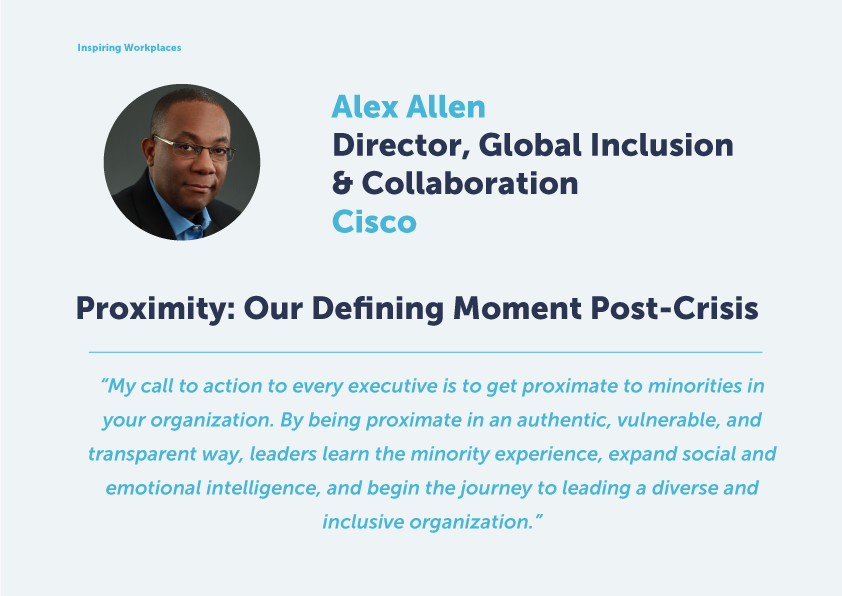
28th October 2020
Inspiring your people in a changing world – Proximity: Our Defining Moment Post-Crisis

I have felt a dramatic range of emotions while viewing the recent events involving African Americans and people of color in our communities. I’m furious watching the replays of these tragedies that have been all too common occurrences in our society. I also feel a sense of optimism because the faces I’m seeing and the voices I’m hearing in support of change are more diverse than ever. But how will the business world change in the “post-crisis” era – when we emerge from the compounding effects of racial injustice, the pandemic, isolation, and economic depression. As a Black American, husband, father of two boys, HR practitioner, and a diversity and inclusion leader, I believe business leaders will have to evolve to be successful in this new reality.
I believe the ability to maximize the exponential power of diverse teams will be the single most important leadership capability of the future! The foundation of building an inclusive future for all is for executives to have exposure and knowledge of their diverse talent. My call to action to every executive is to get proximate to minorities in your organization. By being proximate in an authentic, vulnerable, and transparent way, leaders learn the minority experience, expand social and emotional intelligence, and begin the journey to leading a diverse and inclusive organization.
At our core, we all have bias, prejudice, and preconceptions. Our natural bias, coupled with the weight of traditional organizational hierarchies, has impeded the ability and willingness of business executives to collaborate with people who are different from them. This has led to a lack of diverse teams and homogeneous networks. How did we get here? Four hundred years of institutional bias that shows up as racism, sexism, elitism, and other phobias, as well as an absence of interaction with minorities, has resulted in leaders formulating opinions on a minute number of experiences.
In the post-crisis era, I believe the table stakes for true leadership will include education on racial injustice, social inequality and how to be an effective advocate and ally for sustainable positive change. Business leaders will need courage, fortitude, and conviction to be truly vulnerable and transparent with minority talent. In Cisco’s Customer Experience organization, we have encouraged our executives to meet one-on-one with their diverse talent to get proximate and learn about the lived experiences of their minority employees. The power of proximity is compounding. The more often leaders are proximate to difference, the greater the understanding, the more tangible the experience, and the more meaningful the outcomes. These meetings give executives more opportunities to listen, learn, and grow. This exposure provides the leaders with more “data” to formulate new opinions, perspectives, and a comfort level with talent who are different from them. Over time, leaders develop the capability to intentionally experience difference.
In my last blog, I wrote about the power of proximity and our CX leadership’s commitment. Our early insights tell us 100% of employees surveyed agreed with the statement, “I felt safe to share my experiences with my leader,” and 90% agreed with the statement, “I feel more engaged in my organization.” To date, our CX leaders have met with 230 employees.
From my 20-year career working for four Fortune 500 Companies, there were only a few leaders that “truly” understood me as a human being, invested time to understand what I loved to do, and who intentionally put me in a position to succeed. For that handful of executives who did invest time in me, we had many authentic and transparent conversations that brought us closer as humans. And trust me, my loyalty to those individuals was, and is, tremendous!
The leaders that make proximity a leadership mindset, to understand diverse employee experience with a humble, transparent, and authentic approach will be the most successful and powerful executives in the post-crisis era. I’m interested in seeing which leaders emerge. Do your leaders really know their diverse talent? Do they understand the challenges that minorities have in their work-life? What are your leaders focused on? How is your HR team developing leaders in this new era?
This blog is a part of the IW Official Guide: World Mental Health Day Supporting the workplace during the pandemic & beyond. Download the full guide here.

